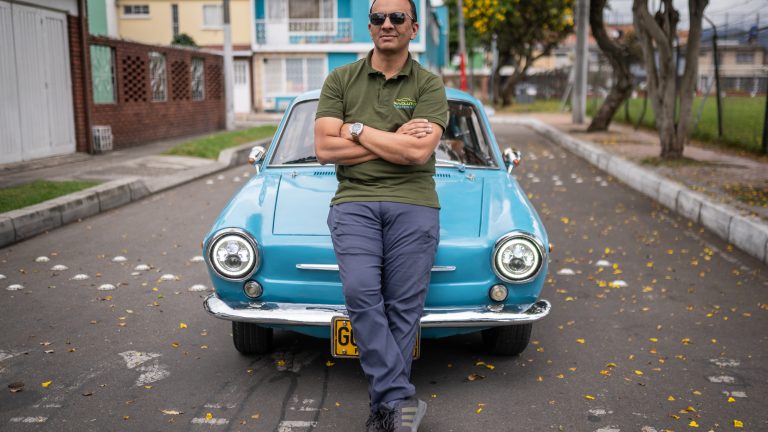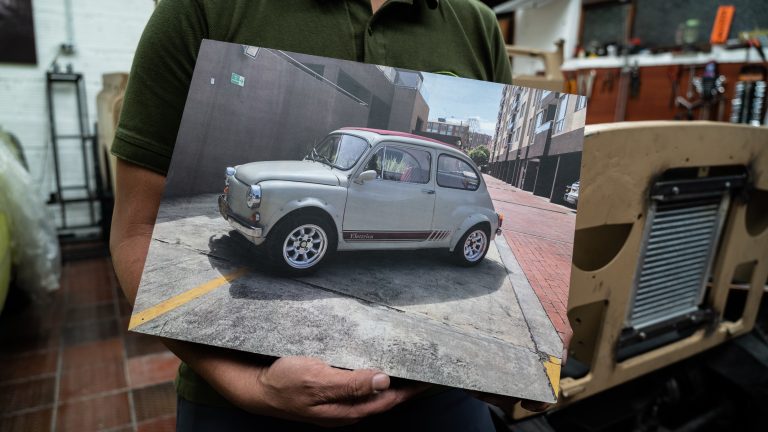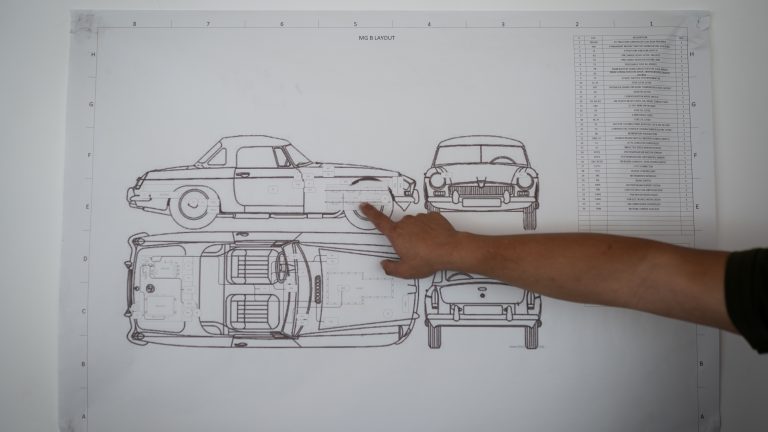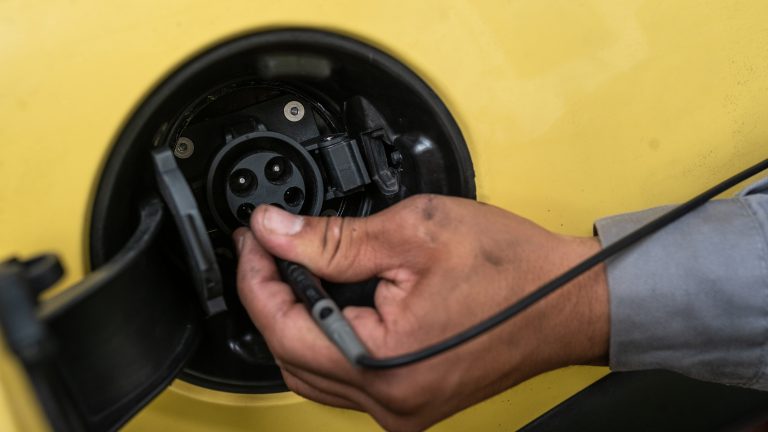The Uruguayan company teaching people how to turn regular cars into EVs
In 2010, Uruguayan president-elect Jose Mujica made headlines for the bright blue mini-truck he rode to his inauguration ceremony. The vehicle, which looked like any ordinary pickup truck, was used to convey a message: Uruguay was serious about its quest to become more environmentally friendly. The gas-powered four-wheeler had been transformed into an electric vehicle by Organizacion Autolibre, a local retrofitting company.
Viral press coverage of the ceremony put the company in the spotlight, sparking interest from EV enthusiasts inside and outside Uruguay who wanted to convert their gas-guzzling vehicles into economical EVs. "This news coverage in many media outlets across Latin America gave a lot of visibility to this technology, and to this day we tour the region every year across Peru, Mexico, Argentina," Gabriel Gonzalez Barrios, founder and CEO of Organizacion Autolibre, told Rest of World. "The same distributors of Autolibre systems permanently invite us to train the necessary technicians to generate the local ecosystem for the local development of this industry."
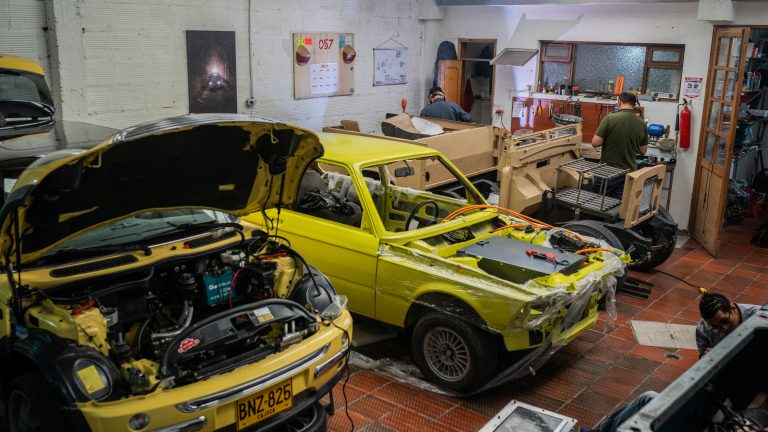
Over the years, Gonzalez Barrios and his team at Organizacion Autolibre have helped convert thousands of traditional vehicles into e-cars across 14 Latin American countries.
The company trains individuals and mechanics through online courses, and supervises conversions for corporate fleets. So far, at least 40 companies have used Organizacion Autolibre's services, Gonzalez Barrios said. While some countries have flagged concerns about the safety of retrofitting vehicles, Gonzalez Barrios said his company is leading efforts to make it a safer and standardized practice across Latin America.
"We want to show it's an industrialized process," Andres Garcia, the owner of a retrofitting shop in Bogota, Colombia, which works with Autolibre, told Rest of World. "This is not for hobbyists or people who are inexperienced." Gonzalez Barrios had the idea for the company in 2006 after watching the Al Gore-produced climate change documentary An Inconvenient Truth. A distributor of chemical products for gas-fueled vehicles at the time, he was inspired to address environmental concerns from his corner of the world.
"We decided to change the combustion engines of our own vehicles into zero-emission electric ones," said Gonzalez Barrios. The experiment was successful and affordable, and led him to found Organizacion Autolibre.
Gonzalez Barrios initially used some American EV kits to retrofit vehicles, but when those became too costly, Autolibre partnered with Zhuhai Enpower Electric, a Chinese electric power system company.
Over the last few years, as the popularity of EVs has grown, so has interest in retrofitting regular vehicles, Bruno Gonzalez, head of sales at Autolibre, told Rest of World. In 2011, the company retrofitted a fleet of delivery vans for Bimbo, the largest bread-making company in the world. Bimbo did not respond to questions from Rest of World.
In its 2020 report[1] about the practice, the Latin American Association of Sustainable Mobility revealed that at least 145 retrofitted vehicles had been officially registered. The Latin American Retrofit Association, co-founded by Gonzalez Barrios, now has more than 30 members across the region. All are either distributors of EV retrofit kits or have workshops specializing in the process.
Retrofitting electric vehicles has been practiced worldwide for over 30 years, with countries like Japan[2] and Australia[3] establishing national guidelines for the process.
A report from the Latin American Association of Sustainable Mobility lists 21 companies that currently sell EV retrofit kits for different vehicles across the world. The biggest incentive to retrofit a vehicle is its affordability, said Gonzalez Barrios. Most new EVs available in Latin America remain out of reach for regular car users.
One of the most popular models, the electric Renault Kwid, costs around £18,100. Converting an existing gas or diesel-engine car into an electric vehicle using Autolibre's process starts at £6,000. Since the practice is largely a DIY process, there are no official statistics on the retrofitting industry in Latin America.
Many retrofitting jobs are done "by tinkerers who seek to extend the life of their petrol cars since they can't afford a new electric one," Adolfo Rojas, president of the Association of Entrepreneurs to Promote Electric Vehicles in Peru, told Rest of World. The retrofitting process requires skilled EV technicians to remove the engine, gas tank, exhaust, and other components within a regular car, and fit the electric motor, batteries, on-board charger, and computer into the empty space. Weight has to be carefully distributed so the car doesn't tilt to one side.
The original electrical components -- such as airbags and sensors -- must function properly, and the battery shouldn't overheat. Autolibre Academy, the company's educational branch, offers online courses on these basic skills to any EV enthusiast interested in retrofitting, Gonzalez said.[4] But Rojas said there are risks associated with the retrofitting process.
Retrofitting kits, many of which are available on online marketplaces like Alibaba[5] or MercadoLibre[6], often don't guarantee a "minimum level of safety and quality for the retrofit unit," Rojas said. Once they've been modified, retrofitted vehicles must get government permits that allow them to be on the road in specific countries, according to retrofitting experts.

In 2021, the Chilean transport ministry passed legislation banning[7] the retrofitting of all used passenger vehicles. "Retrofits were being done, but keeping the car's safety level was being overlooked," Rodrigo Salcedo, president of Chile's Electric Vehicle Association, told Rest of World. A safety compliance regulation is being prepared by the transport and energy ministries.
In Colombia, where retrofitted vehicles face no legal impediment, some are arguing for tighter controls. Garcia, from the car shop in Bogota, said he is working with fellow retrofitting experts and enthusiasts to lobby for specific regulation, including meeting with the Colombian transport department and SENA,[8] the country's professional and technical training service. He said his company sells retrofit kits exclusively to certified technicians.
Jairo Novoa, one of Garcia's customers, retrofitted a 1981 BMW. He told Rest of World the process made sense for an old car like his because spare or repair parts are expensive and hard to find. Although most of Colombia's more than 11,000 electric vehicles are brand-new, retrofitted ones "do not need to envy" them, said Novoa.
Except maybe, "really expensive ones like Tesla."
